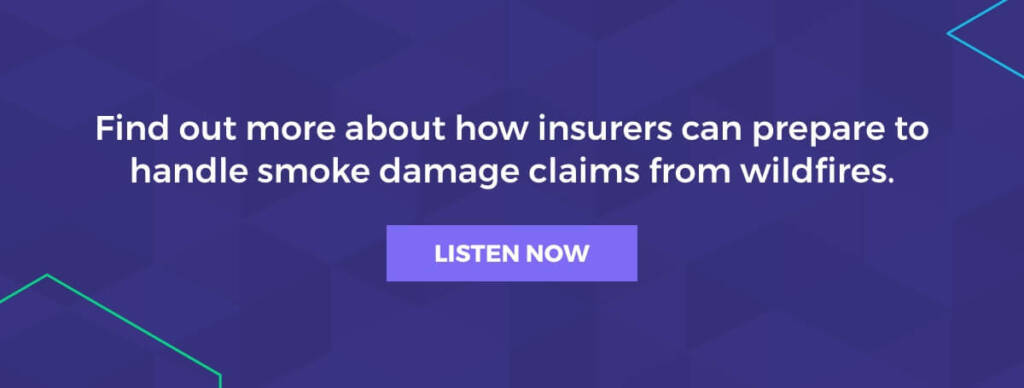In one of our recent episodes of Conversations on the Creek podcast, I, Zach May, had the absolute pleasure of chatting with Tim Greene from Verisk—a meteorologist and the product and analytics manager. We had a deep dive into the world of wildfires, the underappreciated fallout of smoke damages, as well as the exciting potential of insurtech and fresh data sources for insurers.
Here’s a quick rundown of our discussion in the podcast, as well as some additional thoughts. Listen to the full podcast here.
Wildfire Risks: A Rising Concern for Insurers
We kicked off the show with Tim sharing a synopsis of wildfire trends, and how wildfires are particularly rampant in Wildland Urban Interface (WUI) areas—the edge where city life meets the wild outdoors. 2022 marked a disturbing surge in wildfires, with over 60,000 incidents consuming more than 7 million acres throughout the United States. The heart of this devastation was felt most acutely in New Mexico. As we moved into mid-2023, the flames leapt across borders, causing Canadian fires that resulted in disrupted lives, with school closures and flight cancellations among the many repercussions. Those of us living on the east coast of the US, such as in cities like New York became enveloped in fog and temporarily recorded the worst air quality level in the world of any major city. And most recently, the recent wildfires that swept through Hawaii took precious lives. Our hearts go out to all those affected by these tragedies. It’s important to remember that it’s not merely nature’s wrath that’s at play here, it’s also a call to action for us all to better protect our planet and its inhabitants.
For this blog though, let’s turn our attention to smoke damage, an aspect of wildfires that while may not be catastrophic as the flames themselves, but still nonetheless has a significant impact to people and property.
The Headache of Smoke Damage Claims for Insurers
According to Tim, smoke damage claims are a challenge for insurers due to three major hurdles:
-
Limited Data: The scarcity of smoke data from wildfires makes it hard to handle smoke damage claims, leading to more litigation rates. The broad nature of these claims includes insured asset losses from smoke, ash, soot, or embers, causing significant expenses.
-
Time Sensitivity: The rapid degenerative effects of smoke on porous surfaces mean immediate action is crucial. This adds time pressure for insurers to accurately assess smoke damage.
-
Assessment Difficulties: Limited resources and vague public databases make it challenging for insurers to measure wildfire smoke damage. Right now, insurers are relying on the air quality index estimates, but more detailed info would enhance resource allocation for policyholders.
The Financial Impact of Smoke Damage Claims
Another key point made by Tim was that smoke damage claims can pose a significant financial burden for insurers. Insurers who aren’t geared up for adequate damage evaluation may find themselves under-resourced, leading to a larger expense ratio, reduced profits, and diminished shareholder returns. Also, policyholders may find themselves without enough coverage to bounce back from the damage.
Typical smoke claims can hover between $10,000 to $15,000, but limited data and legal issues can rack up the costs pretty fast.
Businesses can also reel under losses from wildfire smoke, like the Californian wineries that suffered major setbacks during the wildfires in 2017 and 2020. Damages led to insured losses crossing the $3 billion mark, partly due to smoke-tainted grapes that couldn’t be used for high-end wines.
Without a clear breakdown of wildfire-related losses, it’s tricky to understand its impact fully. For example, another area of impact is that insurers need to have named peril loss classifications for their reinsurance contracts and loss ratios.
Bottom line? Detailed claim data is crucial for insurers to make better decisions.
Handling Smoke Damage: Handy Tips for Policyholders and Insurers
Tim also offered some practical advice that insurers should proactively provide to homeowners to soften the blow of wildfires. Encourage your policyholders to seal up any openings in their home, including the HVAC system and windows, especially if a wildfire is looming. Avoid activities that can degrade indoor air quality, and try to bring in fresh air when the air quality gets better.
As we all know, insurers also have a part to play in helping policyholders in case they need to file wildfire damage claims. In California, insurers will soon have to abide by new rules that address property coverage ratings in wildfire-prone areas.
These rules involve accounting for certain mitigation factors and submitting rating plans to the California Department of Insurance. This should give a clearer picture of wildfire mitigation efforts at the community and individual property levels. Great news is that other fire-prone states are also showing interest in these regulations.
Concluding Thoughts on Wildfire and Smoke Damage
In conclusion, wildfires pose a rising concern for insurers, especially with the increasing frequency and intensity of fires in recent years. The fallout of wildfires extends beyond immediate property damage, as smoke damage claims present a significant challenge due to limited data, time sensitivity, and assessment difficulties. These claims can have substantial financial implications for insurers, potentially reducing profits and shareholder returns.
In this ever-changing landscape of wildfires and their ensuing damage, insurers must then equip themselves with the right data, resources, and strategies to be better prepared. The key lies in turning challenges into opportunities, and every piece of knowledge gained from such incidents can guide the way for more robust insurance solutions in the future.






